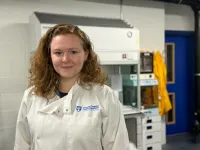(13 October 2024, Vienna, Austria) Cutting-edge research has uncovered how chronic stress disrupts the balance of gut microbiota to speed up the progression of colorectal cancer (CRC), opening new avenues for CRC prevention and treatment.1
By eliminating certain gut bacteria and inducing stress, researchers were able to conclude a relationship between stress and gut microbiota in the progression of CRC, identifying a particular bacterial species as a potential therapeutic target.
Presenting the study at UEG Week 2024, lead researcher Dr Qing Li explained, “In our study, we used an antibiotic cocktail (vancomycin, ampicillin, neomycin, and metronidazole) to eradicate gut microbiota, followed by faecal microbiota transplantation to investigate whether gut microbiota was necessary for chronic stress to accelerate CRC progression.”
The findings showed that chronic stress not only increased tumour growth but also reduced beneficial gut bacteria, particularly Lactobacillus genus, which are essential for a healthy immune response against cancer. Dr Li noted, “Stress-related CRC progression can be attributed to a reduction in beneficial gut bacteria, as this weakens the body’s immune response against cancer. Lactobacillus, being sensitive to vancomycin and ampicillin, was depleted in both the control and stress groups by the antibiotic cocktail. This depletion highlights its crucial role in maintaining gut health and its potential association with CRC progression under chronic stress.”
To further explore how Lactobacillus influences CD8+ T cell levels – which play a crucial role in the body's anti-tumour immunity – and CRC progression, the researchers supplemented mice with Lactobacillus during chronic stress and observed reduced tumour formation. Dr Li stated, “Through faecal analysis, we found that Lactobacillus plantarum (L. plantarum) specifically regulated bile acid metabolism and enhanced the function of CD8+ T cells. This indicates how Lactobacillus may enhance anti-tumour immunity.”
Unexpected findings also emerged during the research, explained Dr Li. “Initially, we thought that L. plantarum might enhance the anti-tumour immune function of CD8+ T cells by initiating metabolite production, as previous findings suggest. However, our in vitro tests revealed that the conditioned medium from L. plantarum did not significantly stimulate CD8+ T cells to produce such key metabolites. This indicates that L. plantarum may require substances in the gut environment to enhance anti-tumour of CD8+ T cells.”
The potential for Lactobacillus-based therapies in treating patients, particularly those affected by chronic stress, is promising. “Combining traditional anti-tumour drugs with L. plantarum supplementation could be a viable therapeutic strategy for patients with stress-related CRC,” Dr Li said.
CRC is a significant health concern across Europe and is the second most prevalent cancer and second leading cause of cancer-related death.2 Its incidence is predicted to rise significantly in the next decade, due to an aging population, unhealthy diets, physical inactivity and obesity.3
Moving forward, the research team plans to collect faecal and tumour samples from CRC patients to analyse changes in gut microbiota among individuals with and without chronic stress. “Our aim is to verify if L. plantarum is significantly reduced in stressed CRC patients and to explore its relationship with anti-tumour immune cells,” Dr Li shared.
This study highlights the intricate relationship between stress, gut microbiota, and CRC, suggesting that strategies to restore gut health may play a critical role in cancer care, particularly for patients facing chronic stress. “Restoring beneficial bacteria in the gut, such as Lactobacillus, could strengthen the body’s natural defences against colorectal cancer,” concluded Dr Li.
END
Notes to Editors
For further information or to arrange an expert interview, please contact media@ueg.eu.
We kindly ask that a reference to UEG Week 2024 is included when communicating any information within this press release.
About the Author:
Dr Qing Li is currently a postdoctoral researcher in Professor Jinlin Yang's research group in the Department of Gastrointestinal Cancer and Liver Diseases, West China Hospital, Sichuan University of China. She is specialised in investigating the mechanism of gut microbiota in the occurrence and development of colorectal cancer.
About UEG:
Founded in 1992, United European Gastroenterology (UEG) is the leading non-profit organisation for excellence in digestive health in Europe and beyond with its headquarters in Vienna. We improve the prevention and care of digestive diseases in Europe through providing top tier education, supporting research and advancing clinical standards. As Europe’s home for multidisciplinary gastroenterology, we unite over 50,000 engaged professionals from national and specialist societies, individual digestive health experts and related scientists from all fields. With our innovative online platform, the ‘myUEG Community’, we enable digestive health professionals from across the globe to connect and benefit from a plethora of outstanding free resources and educational activities. Our offers include UEG Week, our annual congress, online and face-to-face educational experiences, research support, a scientific journal and a range of opportunities in the form of fellowships and grants. We provide numerous guidelines, standards and quality improvement initiatives and campaign at the European level to ensure continued resources for research into digestive health while working closely with patient organisations.
Find out more by visiting: www.ueg.eu
References:
Li, Q. & Yang, J. Chronic stress accelerated colorectal cancer progression by disturbing the balance of gut microbiota. Presented at UEG Week 2024; 13 October 2024; Vienna, Austria.
European Commission. Colorectal cancer burden in EU-27. March 2021. Available at: https://ecis.jrc.ec.europa.eu/pdf/Colorectal_cancer_factsheet-Mar_2021.pdf (Accessed: September 2023).
Estimated impact of the COVID-19 pandemic on cancer services and excess 1-year mortality in people with cancer and multimorbidity: near real-time data on cancer care,cancer deaths and a population-based cohort study From https://bmjopen.bmj.com/content/10/11/e043828, accessed on 04/01/2022. END



